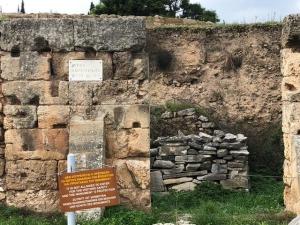
Scripture: Job, chapter 15; Acts, chapters 19-20
Acts 19:23-31 (NASB):
About that time a major disturbance occurred in regard to the Way. For a man named Demetrius, a silversmith who made silver shrines of Artemis, was bringing considerable business to the craftsmen; he gathered these men together with the workmen of similar trades, and said, “Men, you know that our prosperity depends upon this business. You see and hear that not only in Ephesus, but in almost all of Asia, this Paul has persuaded and turned away a considerable number of people, saying that gods made by hands are not gods at all. Not only is there danger that this trade of ours will fall into disrepute, but also that the temple of the great goddess Artemis will be regarded as worthless, and that she whom all of Asia and the world worship will even be dethroned from her magnificence.”
When they heard this and were filled with rage, they began shouting, saying, “Great is Artemis of the Ephesians!” The city was filled with the confusion, and they rushed together into the theater, dragging along Gaius and Aristarchus, Paul’s Macedonian traveling companions. And when Paul wanted to go into the assembly, the disciples would not let him. Also some of the Asiarchs who were friends of his sent word to him and repeatedly urged him not to venture into the theater. So then, some were shouting one thing and some another, for the assembly was in confusion and the majority did not know for what reason they had come together.
Observations:
I suppose that when most people read Acts 19, they focus on the first part of the chapter: Paul’s ministry and the “Ephesian Pentecost.” (As a side note, it’s interesting that the number of people who were filled by the Spirit at this event was “about twelve” [19:7].) The latter part of the chapter tells the story of a riot in Ephesus, started by those who made their living by crafting idols and other items related to the worship of the Greek goddess Artemis. I can’t recall ever preaching on this passage, and I’m not sure I’ve even heard anyone else preach on it! But that’s where God has focused my attention today.
First, these events happened as “the word of the Lord was growing and prevailing mightily” (19:20). When the Spirit is moving and people are transformed, Satan will always try to stop it! It probably won’t involve opposition by those who worship idols (at least they won’t admit it), but opposition will come.
Second, Paul wanted to respond head-on: Paul wanted to go into the assembly. He was the focal point of the tradesmen. Demetrius had started the uproar by complaining about this Paul who has persuaded and turned away a number of people. Paul probably saw it as a great opportunity to tackle this opposition directly.
Not Every Conflict Is a Battle:
But Paul’s friends and traveling companions urged him not to go into the assembly. It was not a reasoned debate; it was a riot. The people involved were filled with rage – and that rage was directed at Paul. The tradesmen didn’t know anything about Jesus; they never even mentioned Jesus. To them, Paul was the enemy. Even if Paul wanted to talk about Jesus, this riot would have been about Paul. I don’t think it’s ever a good thing for us to turn the focus away from Jesus and onto ourselves – even if we don’t intend to do so.
The fact is that the majority did not know for what reason they had come together. Again, this wasn’t an opportunity for reasoned debate. A frenzied mob was out of control, and nothing good for the Kingdom was going to come from that. When Alexander, a Jew, stood up to speak, the crowd shouted him down. “They shouted for about two hours, ‘Great is Artemis of the Ephesians!’” (19:34).
Finally, the town clerk stopped the uproar. He pointed out that they were in danger of being charged with rioting – which was a very serious offense under Roman law. He pointed out that there were courts and procedures available to address claims against other people, and that if they were involved with a riot, there would be no justification. And with that, he dismissed the assembly (verse 41), and Paul went on his way.
Application:
I believe that God is reminding us that not every conflict is a call to battle. I’m afraid that sometimes when we think we’re standing up for the faith, we’re really more focused on standing up for our “rights” – and those two things are not the same. Paul had the “right” to enter the assembly; after all, he was a Roman citizen. But had he done so, he would have become the focal point, and that is not what Paul wanted. His friends recognized the danger, and urged him not to go in – but I don’t believe that the danger is the primary consideration. The primary consideration ought to be, “What does this mean for the kingdom of God?” How does this reflect on Jesus? How does this demonstrate a Christlike character? Does this lift up Jesus – or does it lift me up?
I don’t believe that God was concerned about the danger to Paul. After all, Paul had been threatened before, and God delivered him. God’s desire was that whatever Paul did would either further the gospel or at least not hinder it. I believe that was also Paul’s desire – and it should be ours as well.
Prayer: Father, thank you for reminding us that not every conflict is a call to battle. Help us to not “go looking for a fight,” because that can make us the focal point rather than Jesus. Instead, enable us to follow Jesus’ example. Inspire us to have the same attitude that Jesus had – that everything we do be in obedience to your call, and for your glory. Amen.












